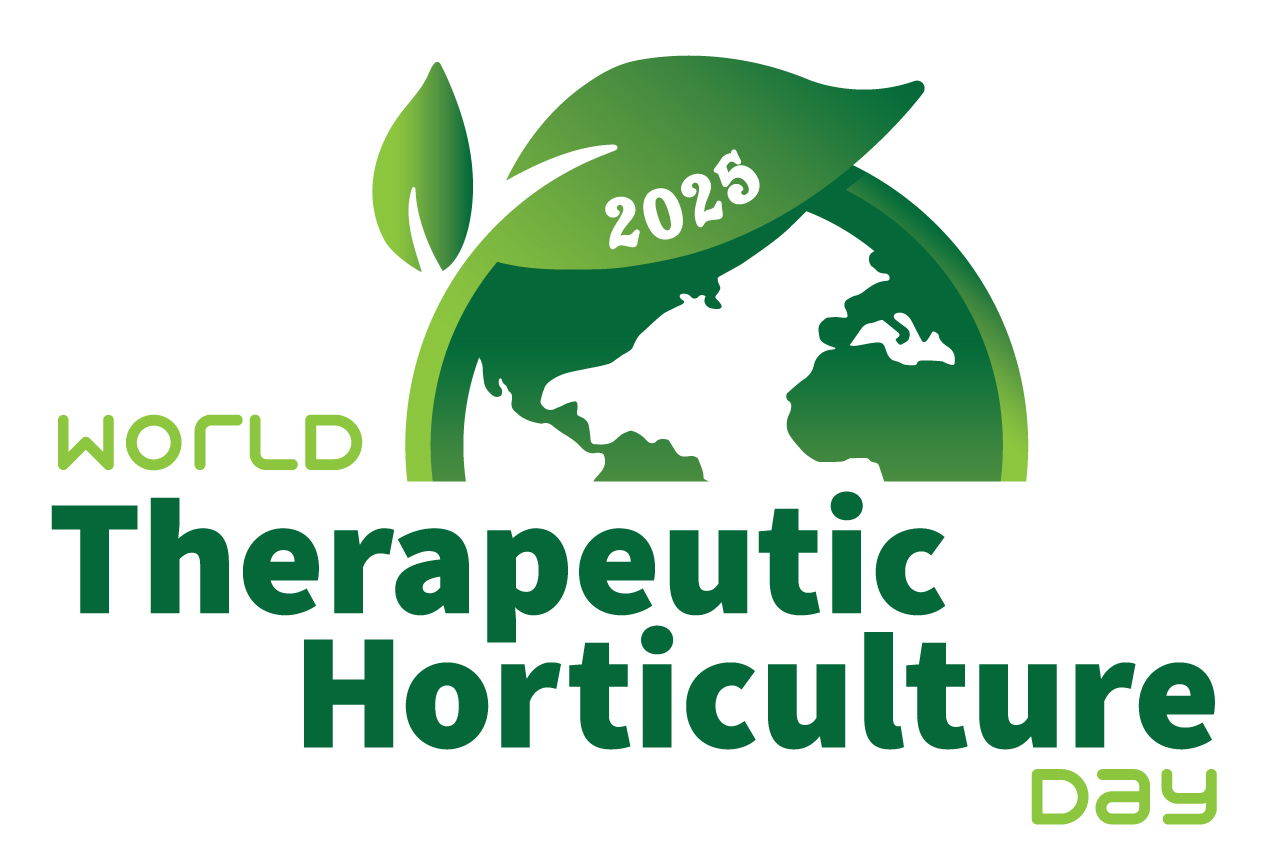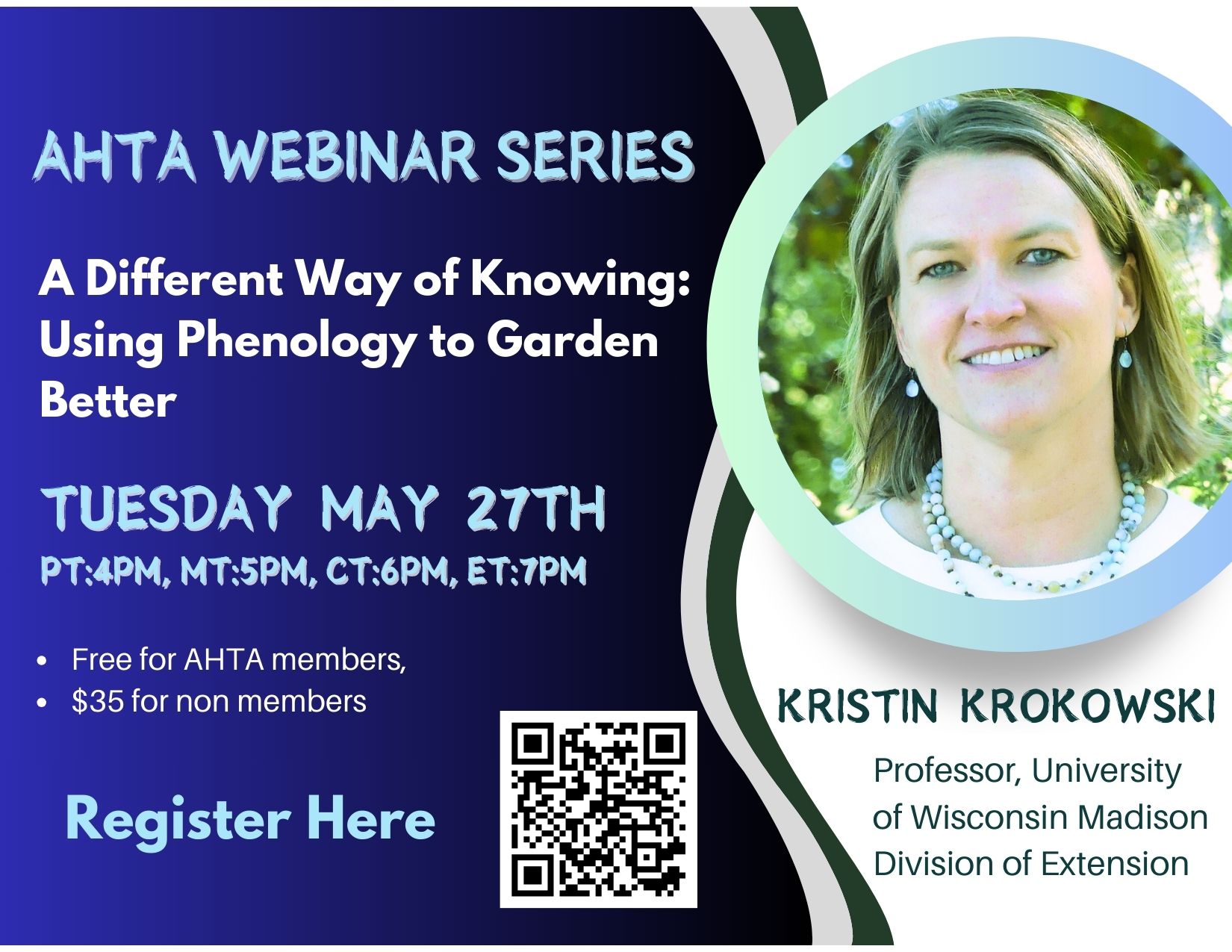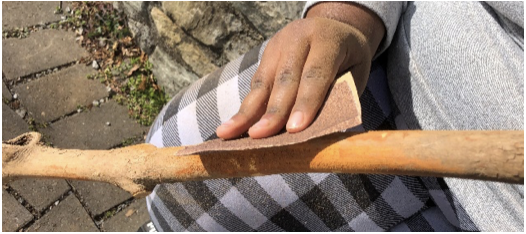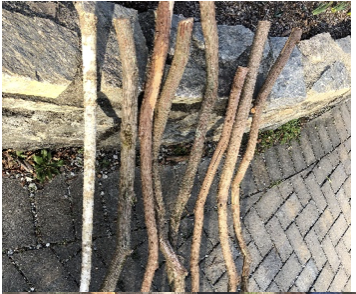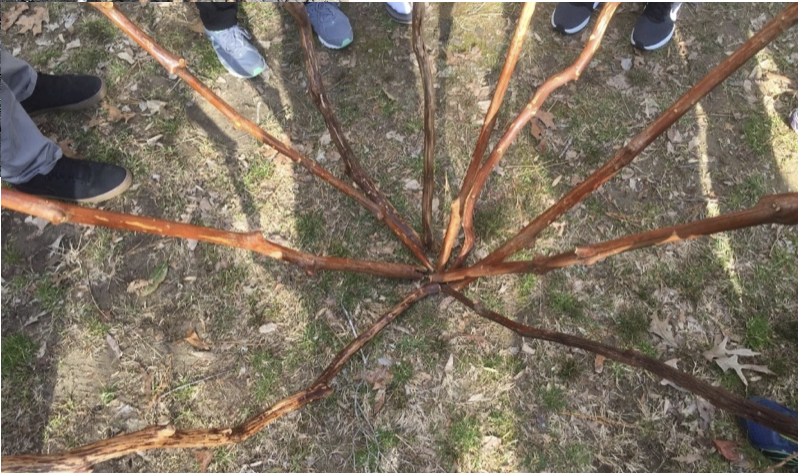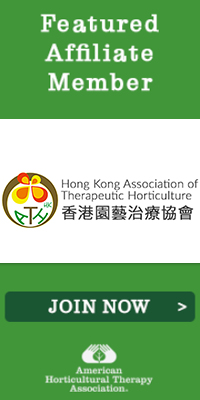May 2025 Newsletter
President's MessageDear AHTA Community, Spring has sprung, and I’m blooming with excitement to connect with you in this newsletter! I know this is your favorite season as it’s mine. The AHTA is all in on one word: GROWTH. You, our incredible members, are the roots of the American Horticultural Therapy Association, and together, we’re sprouting a brighter future for horticultural therapy. Let’s keep this garden growing! At AHTA, we’re here to help you thrive. Our webinars bring fresh ideas to supercharge your practice, while our annual conference is the place to swap stories, learn, and cultivate connections with fellow practitioners. Our advocacy work shouts from the rooftops about the healing power of horticultural therapy, and resources like the Journal of Therapeutic Horticulture keep you growing strong. Why did the plant join AHTA? Because we have leafed a legacy of advocacy work for the field for over 50 years! This May, we’re gearing up for World Therapeutic Horticulture Day on May 18, a global celebration of how plants and gardens heal body, mind, and spirit. Join us in spreading the word—share your stories on social media (tag AHTA!), or lead a workshop to show the world why our work matters. Your work—whether guiding clients through therapeutic gardens, advancing research, or planting seeds of hope—fuels our mission to transform lives through the active, healing process of horticultural therapy. So, let’s dig in! Join a work team, share your expertise in our journal, or volunteer to help AHTA blossom for the next 50 years. Together, we’re not just growing plants; we’re growing hope, health, and community.
Matthew Janson CTRS, HTR,
AHTA President News and Events
Save the Date for the 2025 AHTA Annual Conference!We’re thrilled to announce that AHTA’s 2025 Annual Conference is just around the corner! Theme: Nurturing Community: Planting the Seeds of Our Future This year’s conference will offer exciting new ways to connect with colleagues, engage with presenters, and grow together as a professional community. To view the 2025 AHTA Conference page, view more here. Mark your calendars and stay tuned for the big reveal of our fantastic keynote speaker! We can’t wait to see you there! World Therapeutic Horticulture Day May 18, 2025Thanks to the efforts of a collaboration of international organizations focused on horticulture as therapy, the annual World Therapeutic Horticulture Day will be held on May 18, 2025. Thank you to all for your leadership in this project. The goal of World Therapeutic Horticulture Day is to raise awareness about the therapeutic benefits of horticulture throughout the world. It is our hope that this day will continue to grow in the years to come. Be sure to tag AHTA in any of your social media posts for this day! Call for Submissions: AHTA 2025 Virtual Conference!Exciting news! Our annual conference is going virtual this year, kicking off on October 9, 2025 with something new: selected horticultural therapy programs will showcase their work in 30-minute presentations. Also debuting—10-minute restorative HT breaks to help us all recharge between sessions. Apply now to be part of this inspiring day! Submission details HERE
Deadline for submissions is June 5, 2025.
2025 Spring WebinarsA Different Way of Knowing: Using Phenology to Garden Better
In an era of unpredictable weather patterns, where temperature swings and rainfall fluctuations can vary dramatically even within the same region, how can we cultivate deeper wisdom in the garden? The answer lies in phenology—the time-honored practice of observing the rhythms of nature to guide our gardening choices. This session invites you to slow down and tune in to the subtle yet profound signals of the natural world. By studying the life cycles of plants, insects, and wildlife, you'll gain insights that no search engine or forecast can provide. Discover how to recognize nature’s cues—when the lilacs signal it’s time to plant, when the fireflies indicate soil warmth, and how pollinators reveal the health of your garden ecosystem. Join us for an exploration of this centuries-old science, learning to work in harmony with nature’s calendar. Whether you are a seasoned gardener, a horticultural therapist, or someone who simply finds joy in the garden, phenology offers a richer, more intuitive way to cultivate resilience and connection in your green spaces. Our speaker: Kristin Krokowski. Professor, University of Wisconsin Madison Division of Extension. Her research and programming focus is on produce safety, farmers' markets and the success of small to medium size fruit and vegetable growers throughout Wisconsin. She is a Lead Trainer for the Food Safety Modernization Act Produce Safety Alliance Training. Kristin also provides leadership for the Wisconsin Farmers Market Association and educational programs and technical assistance to farmers’ market managers and vendors including market start-up, marketing, production, pest management, EBT (SNAP) and produce safety. She works locally and in collaboration with colleagues statewide to provide education and diagnostic services to the landscape industry and municipalities on ornamental horticulture. Kristin’s B.S is in Ecosystems Management from Sheldon Jackson College in Sitka, Alaska and her M.S is in Horticulture from Purdue University. She is an avid and sometimes successful home gardener.
Register Here
Horticultural Therapy CertificationAfter many years of thoughtful consideration, AHTA is actively developing a certification for Horticultural Therapists. While some details are still being finalized, we want to keep our members informed and share what you can expect as this important credentialing process moves forward. What is the AHTA Certification?The AHTA Certification is a formal recognition that an individual has met established professional standards in horticultural therapy. It assures employers, clients, and the public that certified professionals possess the knowledge, skills, and experience necessary to practice effectively and ethically. The certification process includes requirements for education, professional experience, and the successful completion of a comprehensive examination. The exam, currently in development, is based on six key domains identified through a large-scale Job Task Analysis involving input from the horticultural therapy community. These domains are:
The certification examination is anticipated to launch in October 2026. Who is the Certification for?The certification—tentatively titled Horticultural Therapist–Board Certified (HT–BC)—is designed for individuals seeking to be recognized as credentialed horticultural therapists. It is expected that HT–BC will eventually replace the current HTR designation as the primary credential in the field. Community Meetings on the CertificationAHTA will hold several community meetings for feedback on the upcoming certification. Stay tuned for dates and times. Frequently Asked QuestionsWhat will happen to the HTR designation? AHTA will stop accepting new HTR applications approximately three months before the launch of the certification exam. After that, all new applicants will apply for the HT–BC certification. Current HTRs may continue to use their designation. Those who wish to obtain the HT–BC credential may take the certification exam, but it is not mandatory. Will this affect the THP designation? No. The certification exam is not expected to be required for Therapeutic Horticulture Practitioner (THP) applications. The THP designation will remain unchanged. How do I know if I’m eligible to sit for the certification exam? Eligibility requirements will include specific education and experience criteria, which will be published well in advance of the exam launch. These will align with national standards for professional certification. Will there be study materials or prep courses for the exam? AHTA plans to provide recommended resources, sample examination questions and some guidance on the examination. The exam will be based on what practitioners are expected to know so applicants education and training should be the best preparation. How long is the certification valid, and what is required for renewal? The certification is expected to be valid for five years. To maintain certification, individuals will be required to complete continuing education and/or demonstrate ongoing professional activity, as defined in the recertification guidelines. AHTA ‘Growing Impact’ Youth Wellness Campaign UpdateIt has been inspiring to see how the youth campaign is connecting with people. The ‘Growing Impact’ Youth Webinar Series has drawn great attendance, with high energy and active participation throughout. With new collaborative organizations aligning with AHTA for the youth initiative, it looks like another webinar is on the horizon to add more perspective to the youth webinar series. Details soon to follow. We’re also excited to begin spotlighting standout HT/TH events from across the country, conducted by our AHTA member base. These initiatives are being designed to support youth in strengthening their holistic well-being and essential life skills through the healing power of the people-plant connection and horticulture as a therapeutic pathway. Sponsorship for the ‘Growing Impact’ Youth Wellness Campaign and the AHTA Annual ConferenceExcitement is building for this year’s virtual AHTA Annual Conference, bringing together leaders, professionals, and changemakers globally. The ‘Growing Impact’ Youth Wellness Campaign will also be woven into key aspects of the annual conference, highlighting the critical role of reconnecting youth with nature and showcasing the powerful impact of people-plant engagement on their overall well-being. Sponsorship opportunities are now available for both the youth campaign and the annual conference. This is a unique chance for organizations to support transformative work while gaining meaningful visibility among a vibrant professional network dedicated to wellness, growth, and the restorative power of the people-plant connection. More partners and sponsors to follow! Please direct any questions to [email protected].Making a Walking StickText by John Murphy, HTRPhotos by John Murphy
ACTIVITY DESCRIPTION: Participants will make their own walking sticks to represent the help needed on their life journey GOALS:
MATERIALS: Hardwood sticks, about 4’ long & 1-2” diameterHeavy duty scouring pads
Sandpaper, 60 & 150 grits
Polyurethane or acrylic (spray on or brush on)
HandsawDrill with ¼” bit
Parachute cord or leather strips
ScissorsBeads (optional)
Face masks (optional)
STEP-BY-STEP PROCESS: Pre-Session Preparation: Cut sticks to length and drill a hole through each about 1” from the top (or if appropriate, have participants drill holes). Gather all other materials and place outside, perhaps around a picnic table. Have one finished walking stick for demonstration. Note: Any hardwood stick will work with this activity, however they should be dry (not green) and be free of decay.
APPLICATIONS FOR POPULATIONS: This activity is appropriate and enjoyed by diverse populations, however it is a fairly physical activity and requires significant strength and stamina to complete. Some participants may not realize the physical effort required until they are part way through the activity and may need assistance to complete. The activity is most applicable for adult populations who have experienced some trauma or are recovering from addiction. If the sticks are completed in enough time, a walk in the gardens or woods using the sticks is a good follow-up activity.
HTR Internship Sites and Intern Supervisors Information UpdatesAHTA receives numerous requests for information from students in Horticultural Therapy educational programs and applicants for the Horticultural Therapist – Registered regarding the internship requirements for registration. A list of internship sites that meet the requirements for HTR internships, as well as the list of approved Intern Supervisors, are available on the AHTA website. We ask for your help to update those lists. If you are part of a program that is currently on the list of Intern Sites, AHTA members please check your program and contact information on the AHTA website Internship Sites. If you need to make updates, contact the AHTA office at [email protected] . If you know of a program that is already hosting HTR interns and is not listed, or you are part of a program that would like to be listed as an internship site, please go to the Internship Site Questionnaire on the Horticultural Therapy Internship webpage, under the Professional Registration tab. If you have been a HTR for at least 1 year and would like to be listed on the website as an Intern Supervisor, please complete the application at Intern Supervisor Application . If you have any questions, please contact the AHTA Office. AHTA Journal of Therapeutic HorticultureThe AHTA Journal of Therapeutic Horticulture had been approved for the OpenAccess Model and is now available on Google Scholar. Did you know that you can access the copies of the AHTA Journal of Therapeutic Horticulture by going to Google Scholar, putting in the “AHTA Journal of Therapeutic Horticulture” in the search window and to narrow down your search add the volume number from the AHTA list of Journal. Click HERE to learn more. While considering publishing in the AHTA Journal of Therapeutic Horticulture consider that as members of AHTA there is no charge for the Article Processing Charge (APC) while nonmembers pay $300. Another great way to become a member! Hoping to see more submissions that will go out to all! Supporting AHTAYour generous support makes it possible for our organization to grow and thrive. Your contributions help keep us going, including helping with the expenses of our annual conference, increasing our ability to work toward credentialing, offsetting the cost of our journal and other outreach publications, and connecting to colleges and universities, facilities, prisons, hospitals, and agencies that support the profession of horticultural therapy. Our 2025 Partnership Guide is now available! In keeping with the forward growth of AHTA, we have redesigned our 2025 Partnership Guide to include new “á la carte” sponsorship opportunities! These options can be selected independently of AHTA sponsorship packages or added to enhance them. The goal is to offer sponsors greater flexibility in shaping their partnership opportunities to better align with their specific needs and objectives, resulting in a more tailored and impactful collaboration. Sign up to become a sponsor today! Your support fuels our mission to continue advancing the development of horticultural therapy and making an impact nationally and worldwide. Ways to Support AHTA
|
||||||||||||||||


